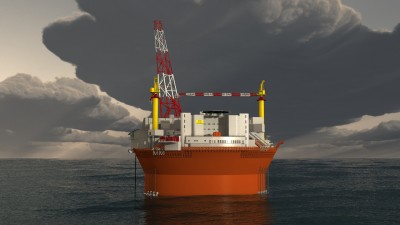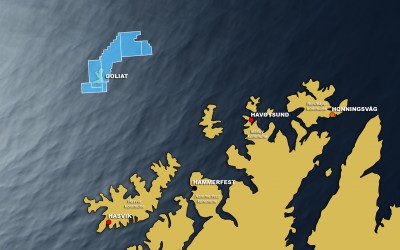Record numbers of delegates were gathered in Norway’s northern city of Tromsø on Monday for the largest Arctic Frontiers conference ever, but some of the issues they faced may become moot. Controversial oil and gas projects, for example, now literally face being put on ice, mostly because of profitability and technical challenges.

Environmental concerns have long haunted the ambitious offshore exploration and production projects that oil companies have eyed in the Arctic. Now, with oil selling for less than USD 50 a barrel, projects launched at a time when prices were well over twice that level suddenly may not even break even much less turn a profit.
Some projects are already showing themselves to be overly challenging both in terms of profits, budgets and sheer technical problems tied to their pioneering nature in a harsh environment. Development of the Goliat oil field in the Barents Sea, for example, has run into various problems since oil and gas were found at the site north of Hammerfest in 2000.
Italian oil company Eni, which holds a 65 percent stake in the Goliat field, budgeted NOK 31.3 billion for the project when development was underway in 2009 (around USD 5 billion at the time), but newspaper Dagens Næringsliv (DN) has reported that its costs have since risen by 49.2 percent, to NOK 46.7 billion. The special offshore platform and equipment being built for the project at Hyundai in South Korea has been delayed and production is finally due to begin this summer, nearly two years later than planned.

DN noted that the Norwegian state will be picking up most of the extra costs so far, since it agreed to cover more than 90 percent of the field’s development. Last week, though, DN reported that oil consulting firm Rystad Energy had determined that Goliat needs an oil price of USD 95 per barrel to break even given all its delays and higher costs. With oil prices dipping as low as USD 45 last week, the profitability outlook is bleak, according to Rystad. Even if prices average USD 70 during the life of the Goliat field, it may end up with negative value.
Eni officials maintain the field will be profitable and a spokesman in Norway didn’t want to comment on Rystad’s calculations. “The project is profitable for its partners (Eni holds 65 percent and Norway’s Statoil 35 percent) and contributes large revenues to Norwegian society through petroleum taxes,” Andreas Wulff of Eni Norge told DN. “Goliat has also generated large ripple effects for the Norwegian oil supply industry, through deliveries to development of the field.” Wulff said the production phase of Goliat will generate additional major economic activity through its operating and maintenance needs.
DN also reported last week, however, that several other Arctic projects face major challenges because modern materials aren’t good enough to withstand the extreme cold of some areas of the Barents. Those areas are far to the north of Goliat and another huge field not far from Goliat, Johan Castberg. Even the new Knarr field much farther to the south, off the coast of Rogaland, has seen its development costs rise by 36 percent while the oil price collapsed. DN reported that Knarr’s owners (BG Norge, Idemitsu, Wintershall and RWE Dea) hope the market improves and oil prices rise.
Offshore risk
All offshore projects are under threat, while those in the Barents Sea are especially vulnerable, according to senior analyst Malcolm Dickson at the consulting firm Wood Mackenzie. He’s uncertain about the profitability of prospective fields in the Barents, for example Statoil’s Johan Castberg, which he called “complicated and uncertain.” He told DN that there are still possibilities for major oil and gas discoveries, but extracting the oil and gas is difficult.
Jannik Lindbæk Jr, information director at Statoil, told newspaper Dagsavisen over the weekend that the oil industry itself must adjust to lower oil prices and their consequences. “We have to meet and take responsibility for what clearly are industry challenges tied to production, costs, profitability and competitiveness,” Lindbæk said. Cost-cutting has been a major issue at Statoil for the past year, and projects like Castberg are under constant review, officials have said.
While British researchers at the University of London announced last week that all Arctic oil and gas should be left under the seabed, in order for the world to reach its climate goals, the roughly 1,400 delegates attending the Arctic Frontiers conference in Tromsø had energy and the environment on their agenda. Foreign Minister Børge Brende was addressing the crowd from 31 countries Monday morning, and also would meet with Prince Albert of Monaco and the US special representative on Arctic issues Robert J Papp among others.
The conference is a major international arena for discussing Arctic issues, not least the threats posed by climate change and what’s causing it. Environmentalists who have long called for all oil and gas exploration to cease now appear pleased that drilling for it may not be worth the effort and expense.
newsinenglish.no/Nina Berglund

